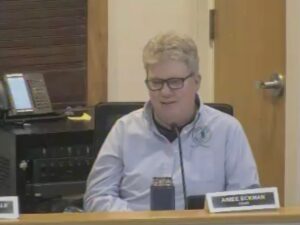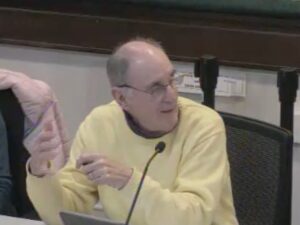This article was updated on Feb. 27.
EASTHAM — After changing her mind on the residential tax exemption (RTE), select board chair Aimee Eckman defended her decision in front of unhappy members of the Eastham Part-Time Resident Taxpayers Association (EPRTA) at the group’s winter meeting on Feb. 5. Its president, Tom McNamara of Weymouth, criticized the policy as an unfair tax on people unable to vote on town matters.
“The select board has never come to us and asked for our help,” said McNamara. “They’ve decided to take the low-hanging fruit, the easy way out, and just overtax the people that can’t vote because they feel we’re silenced, and they don’t have to acknowledge us.”
McNamara later suggested that members of his organization would be encouraged to switch their official residence to Eastham for the purpose of voting here.
Eckman had surprised her select board colleagues on Jan. 13 when she announced she would vote for the RTE at the board’s annual tax classification hearing in the late summer. Eckman’s change of heart gave the RTE a majority of the board members in favor for the first time. Eastham is currently the only Outer Cape town without the tax exemption.
At the EPRTA meeting, Eckman responded to a series of questions she’d received in an email from McNamara, then fielded questions from the 66 people in attendance.
“Please explain why you feel the RTE is the right solution to improving affordable and increasing year-round housing when evidence in Provincetown and Truro demonstrate otherwise,” was one of the questions sent to Eckman by McNamara.
“We’ve never said the RTE is the solution to our housing problems,” she said. “It doesn’t create more housing, but that’s really not the purpose of it.
“Some of you have asserted that raising the RTE rates in neighboring towns means that it’s failing,” Eckman continued, “but it also may mean that a higher rate is needed in those towns. No one starts at the maximum. You have to start small.”
In towns that have adopted it, the RTE allows domiciled homeowners to claim an exemption on the taxable value of their primary residence equal to a percentage of the average property value of a single-family home in the town. Because the policy is by law revenue-neutral, when the RTE is implemented, the residential tax rate increases for all homeowners so as to maintain the overall amount of tax revenue raised. Because the taxable portion of each home’s value is then taxed at a higher rate, the owners of homes with lower assessed values benefit more from the RTE than the owners of homes with higher assessed values.
Some EPRTA members worried that even a small RTE would grow over time, as it has in Provincetown, which recently raised the exemption to 35 percent of the average assessed value.
Eckman later told the Independent that Eastham was likely to start with a 10-percent RTE but that, in later years, it would likely rise to 35 percent, the current maximum allowed by the state for towns not designated as seasonal communities, which as of this year can vote at town meeting whether to accept that designation. If the town meeting votes to do so, the select board would be able to increase the RTE up to a maximum of 50 percent. All of the Outer Cape towns including Eastham have been designated as seasonal communities by the state.
According to data presented at the Jan. 6 select board meeting by Assistant Town Manager Rich Bienvenue, a 10-percent RTE would save a full-time resident with a home valued at the town’s average (currently $782,379) $349 per year. The owner of a house with the same value not eligible for the RTE, or choosing not to take it, would pay $281 more. With a 20-percent RTE, Bienvenue said, the same full-time resident would save $729, while the non-RTE-taking taxpayer would pay $587 more.
Provincetown and Truro both currently have a 35-percent RTE, while Wellfleet’s rate is 32.5 percent.
Eckman said that the select board plans to add an article to the warrant for the upcoming town meeting on May 5 that would authorize special legislation to make year-round rentals of single-family homes eligible to receive the RTE. Such a program currently exists in Provincetown.
Switching One’s Domicile
“Aimee didn’t give any answers on why she flipped her vote,” McNamara said after the EPRTA meeting. “I think that if the RTE goes through, I could see people changing their domiciled residence to Eastham” in order to vote here.
One such effort to get part-time residents to register to vote took place in Truro in 2023, when 66 people, many of them members of the Truro Part-Time Resident Taxpayers’ Association (TPRTA), registered to vote. After news of a voter registration campaign by the association was reported, 34 of the new voters either withdrew their registrations voluntarily or were removed from the voter roll by the town’s board of registrars. The remaining 32 had their registrations upheld by the registrars.
“They were very successful in Truro in terms of the number of people who got voting rights,” McNamara said.
He said EPRTA members who changed their domicile with the goal of changing the town’s tax policy would likely still apply for the RTE as long as it was available.
Eckman, meanwhile, said that part-time residents’ inability to vote in Eastham is their own choice. “A bunch of them threaten to switch their residency whenever this comes up,” she told the Independent. “If that’s the case, we welcome them. But I don’t think many of them will do it over a few hundred dollars a year.”
McNamara said that the EPRTA has been in touch with the TPRTA and other part-time resident associations with the goal of achieving representation for part-timers on the state’s Seasonal Communities Advisory Council, a committee created as part of the 2024 Affordable Homes Act. The policy that allows seasonal communities to raise the RTE to 50 percent was part of that law.
Eckman said it’s unlikely that she will switch her vote again before the next tax classification hearing.
“I haven’t regretted changing my vote,” she said. “I know I made the right choice. I’m more committed now than ever.”
Editor’s note: Because of an editing error, an earlier version of this article, published in print on Feb. 20, incorrectly reported that in seasonal communities the town meeting can vote to increase the RTE. The select board in each town determines whether it will adopt the RTE and sets the percentage at the annual tax classification hearing. The Eastham Annual Town Meeting will be held on May 5, not May 20 as the print version of this article incorrectly reported.



